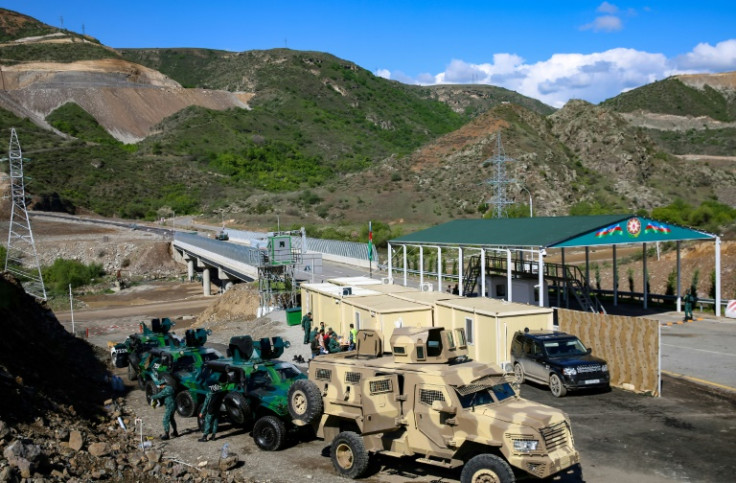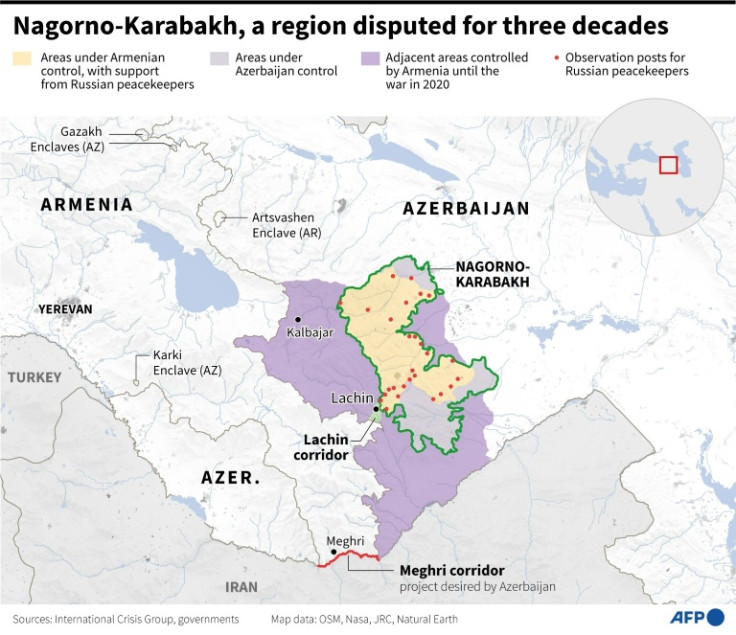Red Cross Restarts Karabakh Evacuations After Protests Over Blockade

Azerbaijan on Friday allowed the Red Cross to resume medical evacuations from its restive Nagorno-Karabakh region to Armenia, after Baku's closure of the sole land link between the enclave and Armenia sparked protests and fears of a humanitarian crisis.
The closure came days before the leaders of the two countries were set to meet in Brussels for EU-mediated peace talks, while local separatists urged Moscow to ensure free movement through the Lachin Corridor that links the region to Armenia.
The Red Cross meanwhile told AFP it had restarted medical evacuations from Karabakh to hospitals in Armenia on Friday evening.
"Eleven patients in serious condition were transported through the Lachin Corridor," said Zara Amatuni, the spokeswoman for the organisation's Armenian branch.
On Friday morning, thousands of protestors rallied in Nagorno-Karabakh to demand Baku reopen the road linking it to Armenia and decry crisis conditions in the region.
Some 6,000 people gathered at the central square of Karabakh's main city Stepanakert, shouting chants such as "No to the blockade!" and "Open the road of life!"
"Russian peacekeepers must guarantee rights and physical survival of the people of Artsakh," Karabakh's rights ombudsman, Ghegham Stepanyan, told the crowd, using the Armenian name for the region.
AFP this week spoke to locals in Stepanakert, who reported food shortages and critical problems with access to medical services.
Demonstrators later marched towards the office of the Red Cross in Stepanakert and the headquarters of Russian peacekeepers deployed in the region, before returning to the city's Renaissance Square, vowing permanent rallies until the corridor is reopened.
Azerbaijani Foreign Minister Jeyhun Bayramov said Baku had offered to provide assistance "regarding the supply needs of the Armenian residents" of the region.
Azerbaijan has said the decision to temporarily shut the Lachin Corridor was made after the Red Cross failed to "prevent illegal actions", such as smuggling mobile phones from Armenia to Karabakh using the organisation's medical vehicles.
On Thursday, an official in the separatist government called on Russia to ensure free movement on the Lachin Corridor.
"The situation is terrible, in a few days we will have irreversible consequences," said Gurgen Nersisyan, a state minister in the rebel government.
Armenia's Prime Minister Nikol Pashinyan earlier announced fresh round of peace talks with Baku, under the mediation of European Council President Charles Michel.
Pashinyan also said the "illegal blockade" of the Lachin Corridor contradicts a ruling of the International Court of Justice (ICJ).
The UN's top judicial body ordered Azerbaijan in February to ensure free movement along the road.
Karabakh has been at the centre of a decades-long territorial dispute between the two countries, which have fought two wars over the mountainous territory, mainly populated by Armenians.
In autumn 2020, Russia sponsored a ceasefire agreement that ended six weeks of fighting between Armenian and Azerbaijani forces for control of Karabakh.
The deal saw Armenia cede swathes of territories it had controlled for decades, while Russia deployed peacekeepers which are manning the five-kilometre-wide Lachin Corridor to ensure free passage between Armenia and Karabakh.
Armenia, which has relied on Russia for military and economic support since the collapse of the Soviet Union in 1991, has accused Moscow of failing to fulfil its peacekeeping role in Karabakh.

© Copyright AFP {{Year}}. All rights reserved.





















